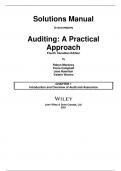Solutions Manual
to accompany
Auditing: A Practical
Approach
Fourth Canadian Edition
by
Robyn Moroney
Fiona Campbell
Jane Hamilton
Valerie Warren
CHAPTER 1
Introduction and Overview of Audit and Assurance
John Wiley & Sons Canada, Ltd.
2021
, Chapter 1
Introduction and Overview of Audit and Assurance
SOLUTIONS TO REVIEW QUESTIONS
REVIEW QUESTION 1.1
In the financial reporting context, ―assurance‖ relates to the audit or review of an entity‘s
financial statements.
An audit provides reasonable assurance about the fair presentation of the financial
statements, while a review provides limited assurance. The audit contains a positive
expression of opinion (e.g., ‖in our opinion the accompanying financial statements present
fairly, in all material respects….‖, while the review contains a negative expression of their
conclusion (e.g., ―nothing has come to our attention that causes us to believe that the
financial statements do not present fairly….‖.
The practitioner is an auditor working in public practice providing assurance on financial
statements of publicly listed companies, or other entities. Intended users are the people
for whom the provider prepares their report (e.g., the shareholders). The responsible or
accountable party is the person or organization (e.g., a company) responsible for the
preparation of the subject matter (e.g., the financial statements).
An ―assurer‖ must have the knowledge and expertise to assess the fairness of the
information being presented by the preparers. Auditors of financial statements need to be
trained accountants with detailed knowledge about the complex technical accounting and
disclosure issues required to assess the choices made by the financial statement
preparers. When undertaking an audit, the auditor should use professional scepticism,
professional judgement, and due care.
Auditors should be independent of the client. Independent auditors have no incentives to
aid the entity in presenting their results in the best possible light. They are concerned with
ensuring that the information contained in the financial statements is reliable and free from
any significant (material) misstatements (error or fraud). A user needs to believe that the
auditor is acting independently. This means that not only should auditors be independent
(i.e., not have any undue personal or financial incentive to protect the client), auditors
should avoid doing anything that would cause a reasonable person to doubt their
independence.
,REVIEW QUESTION 1.2
The users of the financial statements issued by a large listed public company include
shareholders, customers, suppliers, employees, lenders, competitors, and government
agencies. They need information that will help them evaluate the following:
• Future financial performance of the company (including profitability, liquidity, and
solvency
• Whether the company has overseas operations and the nature of their activities in
those countries (e.g., to evaluate exposure to foreign exchange risk and the risk to
the company due to a change in local economic conditions)
• Possible lack of compliance with various laws and regulations, whether the
company (and its industry) need government support.
• Investors are concerned with the value of their investment, employees with their
job security, customers with whether the company is likely to remain in business
long enough to honour warranties, suppliers with whether they will be paid, lenders
with the risk to their loans, competitors with the health of their rivals, and
government agencies will be interested in taxes, tariffs, industry support, and
economic growth.
Users of a sporting team‘s financial statements are likely to be interested in the following:
• Condition and performance of the team (its solvency)
• Whether it is investing in physical facilities, player payments, etc.
• Whether the sporting team supports local businesses and community groups.
Although sports teams are often companies limited by guarantee and have members, the
members are usually unable to trade their interest in the team. Therefore, users of a
sporting team‘s financial statements are not concerned about profitability for its own sake,
but whether it helps the team pay its players and expand its facilities. Creditors and
lenders will be interested in the likelihood that they will be repaid. Government will be
interested with sporting and community concerns, and whether any applicable taxes are
being paid.
REVIEW QUESTION 1.3
Audits are intended to provide the users of the audit report with a positive expression of
opinion regarding the financial statements. An audit is performed using a risk-based
approach in order to perform procedures to obtain sufficient and appropriate audit
evidence to reduce the audit risk to an acceptably low level. However, an auditor cannot
review 100% of the transactions of an organization, and for that reason, while they can
provide an opinion, they cannot provide absolute assurance. Other limitations include the
use of professional judgement, human error, or even fraudulent activities from responsible
parties or in some cases perhaps even the auditor.
REVIEW QUESTION 1.4
A performance audit (value for money audit, operational audit, or efficiency audit) is an
assessment of the economy, efficiency, and effectiveness of an organization‘s operations.
, It can be conducted internally (by internal audit) or externally (by an audit firm) and across
the entire organization or for part of an organization.
Management may request a performance audit (operational audit) of its own company (or
part thereof) in order to assess the economy, efficiency, and effectiveness of the
organization. Ideally, the audit would identify issues that need to be addressed in order to
increase the performance of the division or company. For example, the audit could
examine a logistics department. It would assess the cost of running the department, the
number of deliveries per input (such as labour hours or vehicle hours), and indicators of
delivery on time to the correct address.
A performance audit could be conducted on a government department or agency as part
of the process of accountability to the public. Stakeholders of government entities are
usually seen to be more interested in economy, efficiency, and effectiveness than in profit,
or surplus. Performance auditing can expose poor practices, or even corruption, in an
organization. Performance auditing can provide information on the implementation of
government policies. Regular performance auditing of government entities can help build
trust between the government and its citizens.
REVIEW QUESTION 1.5
Internal auditors are employees of the company, and therefore cannot be completely
independent of the company. However, it is possible to increase the independence of the
internal audit department through means such as funding, terms of reference, and lines of
reporting.
A well-funded internal audit department can investigate more issues and spend more time
on each investigation, potentially increasing the chance of discovering fraud and other
problems. An internal audit department with a small budget is likely to have fewer and less
qualified staff (because they will be lower paid), and will have to make compromises on
the issues to be investigated.
An internal audit department with wide terms of reference has the freedom to pursue the
issues that the audit staff believe are most important or create the most risk for the
organization. A department with narrow terms of reference could be limited to investigating
only certain matters, or must seek the approval of higher levels of management before
commencing any investigation.
If the internal audit department reports to the CFO, it is possible that the CFO will prevent
some issues from reaching other members of the management team, or the board of
directors. Often, the problems will be within the CFO‘s department, creating a conflict of
interest for the CFO when deciding whether to report the issue more widely. An internal
audit department that reports directly to the audit committee is outside the normal lines of
management and reporting, thus being more independent. The audit committee is part of
the board of directors. Therefore, reporting to the audit committee increases the chance
that the highest level of the organization is aware of the problems and will approve the
investigation. The audit committee also deals with the external auditor. If the internal





